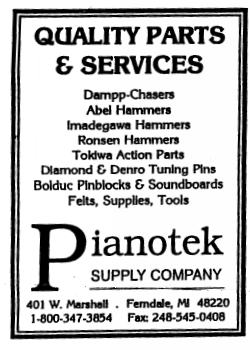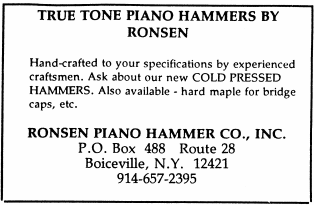|
by Michael Slavin, RPT When it is necessary to re-pin a wippen in a drop-action spinet in order to remove or replace an elbow, an Acrosonic lifter finger, or to repair a broken "ear" on the wippen itself, here is an easy way to simplify the process. Depress the two contiguous keys on either side of the note on which you are working, and insert rubber tuning mutes between the keys to keep them depressed. Example: if you are repairing C4, depress both A#3 and B3, and C#4 and D4, and then place the mutes between the A#3 / B3, and the C#4 / D4. This consequently raises the wippens to these particular notes and keeps them up and out of the way, providing unobstructed access to the wippen in need of repair for center pin extraction or insertion.
|
by Paul Eccardt, Chapter President This winter is much colder than most, and pianos are dropping in pitch much faster than normal. The heat in our customers' homes is on excessively, causing the soundboards to dry out, and making the pitch drop. The type of heat they use makes a difference; the dryer the heat, the worse it is on their pianos. Steam heat is not as bad as forced hot air heat. Humidifiers are helpful in two ways; they put humidity in the air, bringing up the percent of humidity, which also causes the room to feel warmer. People will then tend to turn their thermostat lower. Less heat is better on their pianos. The type of heat they use is a big factor. If you bring a hygrometer (humidity gauge) with you on the job, you will see big differences in humidity from home to home. My house has steam heat upstairs and baseboard heat downstairs. Even though basements usually have higher humidity, it has 5% less humidity than upstairs. When your customers wonder why they just had their piano tuned six months ago, and now it needs a pitch raising, blame it on: too much heat, the type of heat, and lack of a humidifier. If you have your hygrometer with you, you can prove it to them.
|

